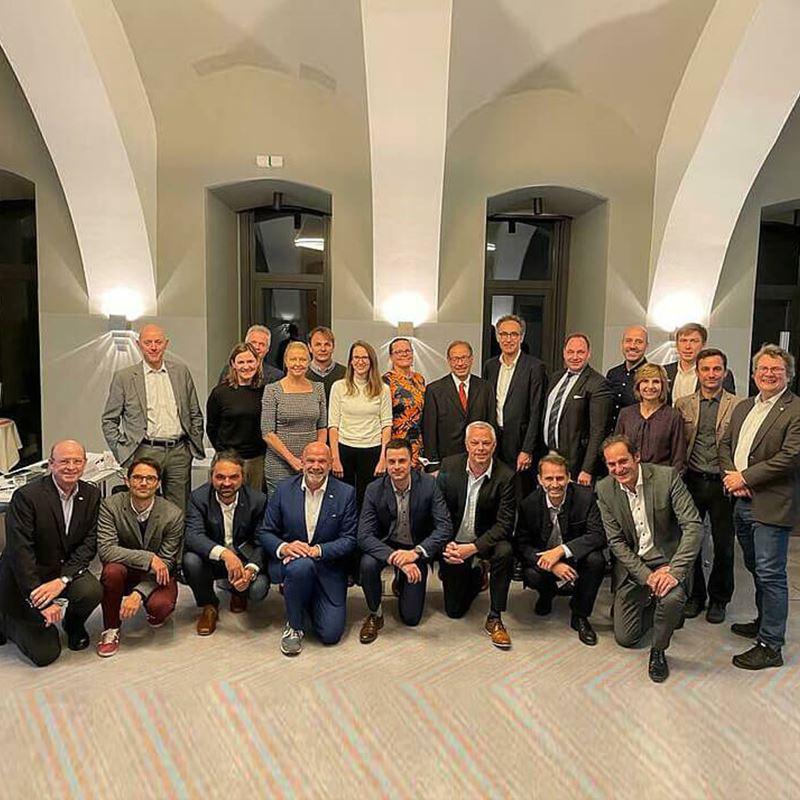Report from the first IUFRO-MONDI Partnership Think Tank Meeting by Daniel Boehnke, IUFRO-Mondi Partnership Manager
The IUFRO-Mondi partnership was established in 2021 with the aim to create a science-business platform to better understand climate change impacts on forests and to identify response measures in line with the Sustainable Development Goals (SDGs). Activities of the partnership include Think Tank meetings, Stakeholder Dialogues, scientific studies, and training workshops.
More information on the partnership here.
The first Think Tank meeting addressed “Climate change impacts on forests in the Pan-European region and response options for the forest-based sector”. It was held in Vienna in October 2021 with 27 participants from 12 countries representing science and various segments of the forest value chain.
Latest research shows that the Pan-European region will face further and increasingly rapid and widespread climate change, significantly impacting forests and the entire forest sector alike. Projections of climate change scenarios show that heat and drought extremes will cause increased risk of disturbances, including widespread bark-beetle outbreaks and forest fires. The Think Tank elaborated on these aspects along with other key impacts likely from climate change.
“Climate change is happening fast,” said the first of the four keynote speakers, Dr. Florian Kraxner of the International Institute for Applied Systems Analysis (IIASA). “It will impact forests across Europe, but at different pace and with varying intensity in the different bio-geographical regions. The strongest warming effects are projected across central and south-/eastern Europe, but also for the Nordic countries and the Mediterranean region. Less warming is projected for western Europe. Modelling forest management will play a major role in identifying possible future pathways – particularly for assessing trade-offs and synergies, and for assessing future disturbances,” he said.
During the discussion participants emphasized that many forests cannot sufficiently provide the expected ecosystem services due to climatic changes. New business models are required to reward forest owners in their efforts to maintain and increase various eco-system services through adaptation to climate change. Silvicultural adaptation measures include increasing resistance and resilience through an optimal tree species composition, adapting the rotation length and thinning regimes. Other response options require a science-based discussion about the use of non-native tree species and new business models rewarding forest owners for providing multiple ecosystem services demanded by society.
Keynote speaker Prof. Dr. Jürgen Bauhus, University of Freiburg, Germany, noted: “Future forests will look different. Nearly one third of European forests are monocultures. For the future, we need at least three functionally different tree species in a forest stand. However, increasing the adaptive capacity of forests and forestry will be a very expensive and continuous task.”
Against this background, the meeting also addressed the role of diversified forest genetic resources as a pathway towards more diverse and resilient forests. In her keynote address Dr. Marjana Westergren, Slovenian Forestry Institute, highlighted the importance of genetic trials for successful adaptation. She said: “There are 265 native tree species in continental Europe with multiple gene-pools and genetic adaptations within a single species. Non-native tree species are an alternative, but some are potentially invasive. Provenance and progeny trials are our best tool for figuring out where a particular species and provenance will thrive.”
The fourth keynote speaker, Dr. Filip Aggestam, University of Life Sciences and Natural Resources Vienna (BOKU), Austria, stressed the fact that society and stakeholders have different views relating to forests and forest management and prioritize different ecosystem services. He said: “For policy makers it seems to be the biggest challenge to find a compromise between conservation of nature and biodiversity and the sustainable provision of wood and other ecosystem services. Also, more attention should be paid to improving the understanding of societal values and preferences for specific forest ecosystem services.”
Alexander Buck, Executive Director of IUFRO and Co-Chair of the IUFRO-Mondi Partnership Steering Group, stated: “Scientists at the Think Tank meeting outlined the role of science. While science cannot advocate for specific views and policies, science can provide and communicate latest scientific evidence and robust data as a basis for making decisions that aim at meeting and balancing different societal perspectives and expectations.”
Dirk Längin, Group Head of Fibre Sourcing at Mondi and Co-Chair of the IUFRO- Mondi Partnership Steering Group, said: “The meeting was a great opportunity to dive deeper into some critical forest-sector response options to climate change. We believe that this Think Tank was a successful first step towards our goal to better understand climate change impacts on forests and to identify response measures.”
The IUFRO-Mondi Partnership is looking forward to further engaging various stakeholders to jointly assess views and perspectives on the future of European forest management.
The summary document of the Think Tank meeting with the key messages as well as periodic updates about partnership activities can be found here.


